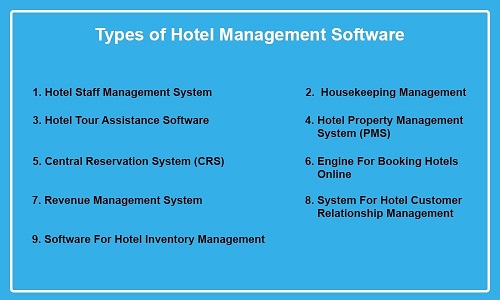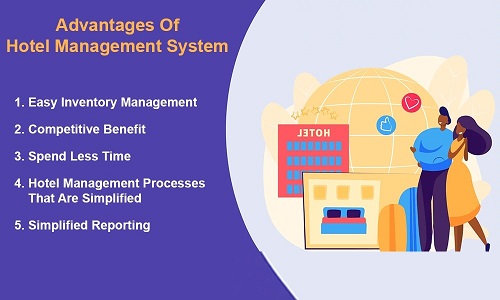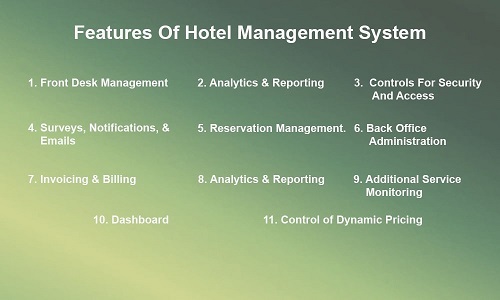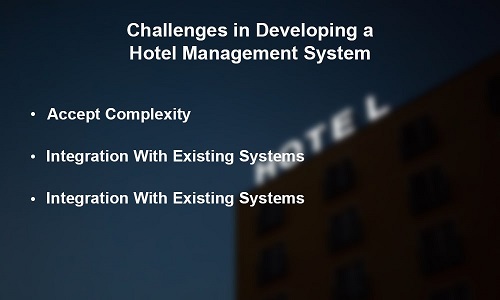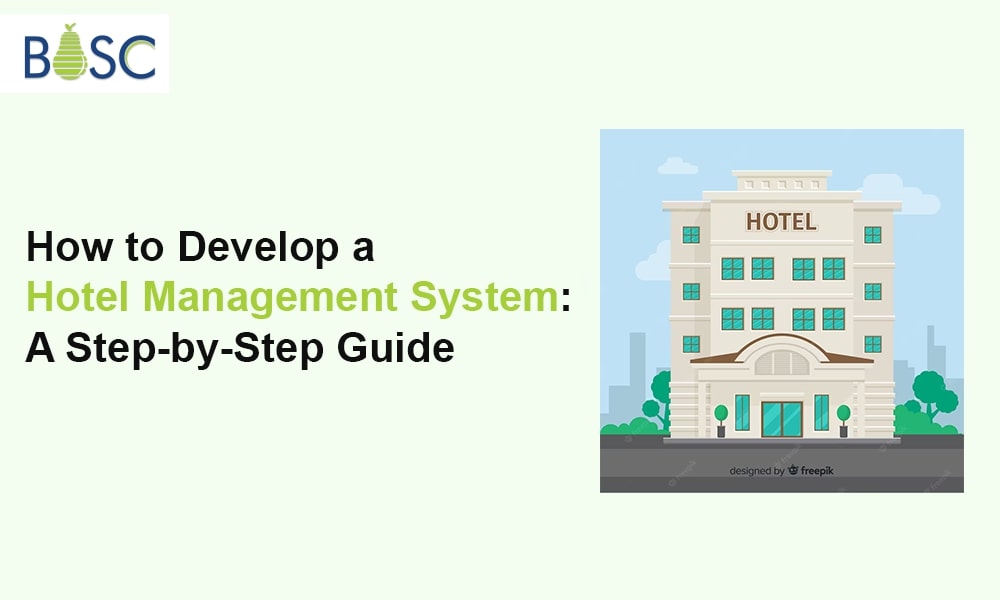
A Complete Development Guide: Hotel Management System (HMS)
There are so many projects waiting to be finished in hotels! Some employ traditional hotel management procedures, while others use distinct software development methods to perform particular responsibilities.
Imagine if your hotel’s reception area is overrun with guests arriving with questions, staff members requesting to make entries, and so on. Given that they have to deal with numerous registers or spreadsheets, your reception team members must have difficulty deciding which question to respond to first. Or it’s challenging even if they need more hotel management software.
What if you could seamlessly streamline all of your hotel management tasks? A centralized hotel management system with modules for each hotel task and team to complete their part would be fantastic, wouldn’t it?
If so, it’s time to design hotel management software specifically to match the needs of your business. However, you must be knowledgeable about designing an end-to-end hotel management system.
Good heart! As we created this in-depth guidance for hotel management software development. Everything you need to know is covered in this blog, including types, features, development procedures, cost analyses, and more.
So let’s build a path to pass through and collect all the information regarding developing hotel management software.
Introduction of Hotel Management System
Hotel management systems (HMS) are software used in the hospitality sector. It aids in managing hotel business operations and providing seamless hotel experiences to guests. But how can this hotel management software provide such ease of use?
You can manage staff, bookings, inventory, and billing in one place with the support of end-to-end hotel management software.
Even third-party apps like payment gateways and websites for booking hotels can be integrated with it. Therefore, you receive reservation notifications directly into your integrated hotel management system, regardless of the booking platform.
Is there any other hotel-related software you can develop besides this one? There are, and we’ll look at them in the part after that.
Which Types of Hotel Management Software Are Available?
Of course, you need a comprehensive system with various components to simplify your hotel management process. And those you can even build independently before integrating them at your leisure. Putting that aside, here is a list of several different types of hotel management software you can create:
1. Hotel Staff Management System
The hospitality industry has personnel separated into teams of experts for various jobs, much like any other industry. Also, the kitchen, room service, and reception teams are part of the hotel management system. Consequently, managing your hotel’s large team members can be challenging if your business is large.
Your hotel staff management software will save you in this situation. You can create a hotel-specific HRMS with HRA, daily reporting, and other features to manage employees and efficiently allocate tasks.
2. Housekeeping Management
If you wish to do it this way, housekeeping management software can be a separate app. You can also create housekeeping management software as a module to interface with your HMS.
The housekeeping/room service staff may find housekeeping management software to be a useful tool. It makes it simple to allocate and schedule cleaning jobs, preserving your hotel’s high standards of hygienic practices and cleanliness.
3. Hotel Tour Assistance Software
You require a hotel tour assistance/guiding feature in a hotel-specific experience app when your hotel spreads out across a vast region and offers a variety of interesting but somewhat complicated things to discover inside.
You can use AR/VR or metaverse technology to develop a hotel tour experience app that allows visitors to explore your hotel physically and virtually.
It makes it easier for clients to locate their rooms independently without staff support and even conveniently explore other hotel attractions.
It is overdue for the hotel industry to use AR/VR-like web3 technical solutions since many hotels have already implemented or will implement VR technology to enhance the visitor experience.
4. Hotel Property Management System (PMS)
A vital component of hotel management software that every hotel business needs. Using a hotel property management system, you may manage front desk operations, housekeeping, accounting, reporting, and more.
5. Central Reservation System (CRS)
It is an integrated system that can assist you in managing hotel activities in real time, including the distribution of inventory, prices, reservations, and more.
A central reservation system gathers your information from systems like PMS, GDS, internet booking registries, etc. Consequently, a single glass pane lets you view the hotel’s data.
You might even refer to this CRS solution as the core of every hotel management system you deploy. It transfers data from one software to distribution channels, the root cause.
6. Engine For Booking Hotels Online
You might choose the development of an online hotel booking app if you want to start a business based on a hotel-related product. What is that, though? Hotel owners can put their properties on an online booking engine to receive reservations.
One study reveals that 38 websites, most of which are online hotel booking engines, are frequently encountered by travelers wanting to make hotel reservations. Additionally, they receive commissions for the success of each deal and charge hotels and visitors for the platform service costs.
7. Revenue Management System
Many parts of the world have different travel seasons based on their climate. Additionally, the peak travel season is when hotels may generate more business and make significant profits.
A hotel revenue management system can be beneficial in such circumstances. In simple terms, RMS aids hotels in optimizing their pricing and other sources of income to correspond with market demand.
In addition, RMS has a data analysis application that enables you to examine many criteria, including the behavior of web visitors and booking scenarios. You can create hotel business plans using the results of this study to provide the greatest deals for potential guests.
8. System For Hotel Customer Relationship Management
When it comes to generating revenue and preserving client relationships, CRM software is a fundamental requirement. You need this custom software development to communicate with guests and convince them to book your hotel for their next travels if your hotel business is a major hotel chain like Marriott or Hyatt.
What makes CRM unique for hotels, then? What function does CRM serve in the hotel and hospitality sector?
A cloud-based CRM platform for hotel management keeps track of visitor information, including reservation history, travel preferences, and more. These data can be used for marketing initiatives, and you can give app users individualized hotel-specific app experiences.
You can utilize a CRM system for guest profiling, segmentation, personalization, feedback management, loyalty programs, upselling, cross-selling, and other purposes.
9. Software For Hotel Inventory Management
In the hotel industry, sustaining a nice customer stay experience depends on the supply. The hotel inventory management system might be of considerable assistance in this situation. It enables you to manage your hotel’s inventory, which includes everything from kitchenware to guestroom furnishings and cleaning supplies. Furthermore, you may maintain control over your hotel inventory by doing this.
Hotel Management Statistics
- In the next five years, technology will likely play a bigger role in determining a hotel’s success, according to a HotelTechReport survey of 81% of hoteliers.
- In five years, 99% of hotels predict that their peers will utilize more technology to manage their operations.
- According to 39% of hotels, technology’s most significant value proposition is “improving operational efficiency”. The majority of hoteliers feel technology can significantly alter front- and back-of-house processes, as evidenced by the responses “transforming guest journeys,” “improving business agility,” and “innovating for the future,” which were each given 31%, 15%, and 13%, respectively.
- The most significant short-term objective of technology, according to 21% of hotels, is to change operating procedures and business processes. Following that, 19% mentioned “driving revenue,” 18% mentioned “better customer experiences,” 18% mentioned “improving efficiency,” and 11% mentioned “reducing operational costs.”
- In the last five years, according to 31% of hoteliers, revenue management technology has advanced more than guest experience technology, which has advanced 28%.
- In contrast, only 14% of hoteliers believe that revenue management technology will experience the greatest transformation over the next five years, according to a survey of 46% of the industry.
- According to 86% of hotels, their property management system is the most vital part of daily operations, followed by their revenue management system and channel manager.
- 39% of hoteliers use integrated payment processing capabilities in their property management system, while 56% use a third-party payment gateway.
- By 2025, 54% of hoteliers reportedly use technology to enhance or entirely replace the front desk experience.
- By keeping these figures in mind, you may make better technological decisions that will keep your hotel relevant and future-proof.
Advantages Of Hotel Management System
You can learn about the following advantages through hotel management systems:
1. Easy Inventory Management
For various purposes, hotels frequently use various inventory distribution systems. You can quickly access and manage your hotel inventory with a hotel system. But how? Through consolidating inventory control.
So, I wish goodbye to the challenges of completing many paperwork and checking processes. And thank you for having access at your fingertips to real-time inventory management.
2. Competitive Benefit
Your hotel management system can open up opportunities for you in the hospitality sector. It comprises seamless hotel management, providing visitors with a top-notch hospitality experience, an ideal working environment for staff, and more.
So you can operate your hotel business on a service like a tech-savvy company. It distinguishes you from your rivals. Additionally, happy visitors will be loyal to your business and recommend it to their peers.
Employees typically stay with your company longer if you give them a better working environment. Their happiness will affect how well they serve your guests, improving the company and brand reputation.
3. Spend Less Time
Hotel management software saves you time and effort on several monotonous tasks with its simple task assignment, team management, visibility over the hotel staff, and many other features.
In addition, you can use this to automate various hotel administration functions, including tracking room availability, collecting reservations, handling payments, producing reports, delegating work, and much more.
Therefore, the hotel application’s automation, visibility, accessibility, and centralized control simplify your job and enable you to spend less time on administrative tasks.
4. Hotel Management Processes That Are Simplified
A hotel management system gives you visibility into the projects that your staff are working on. Additionally, you can learn about free resources available to prepare for upcoming tasks or circumstances.
Obtain daily reporting from your team, and make it visible to some employees with higher positions so they can carry out their management work. In addition to acquiring staff reporting, you can give any employee a task without having to go into the field and look them up before telling them what to accomplish.
Even if hotel management tasks are frequently simplified, centralized hotel management software has some advantages.
5. Simplified Reporting
With only a few mouse clicks, a hotel management system makes it possible to get comprehensive, filtered, and real-time statistics on income, occupancy rate, average daily rate, housekeeping, forecasting, marketing, sales, kitchen supplies, and more.
As a result, you may prepare everything using your tech-driven hotel management system without going through the complicated hotel analysis phase.
Which Features Should Be Incorporated Into a Hotel Management System?
Your hotel management software will only become rich with additional features. Your hotel system can be used to enhance your hotel management processes by adding the proper functionality. So let’s look at some aspects that your hotel management software must have:
1. Front Desk Management
Following the confirmation of the reservation and the activity of the reception employees, the hotel’s appearance is next. They interact with visitors, assign rooms while overseeing room cleanliness, and even handle a variety of hotel distributions and topics.
Including this function in your respectable hotel software system might be advantageous. With this feature, They can streamline check-ins and check-outs, guest profiling, room key management, and room assignment.
2. Analytics & Reporting
Of course, you can also collect a lot of data using conventional hotel management techniques, but doing so requires much work. The advent of AI/ML capabilities in hotel management software has allowed you to leverage the power of data through tools for sophisticated analytics and reporting.
And to obtain rapid and real-time data on revenue and other hotel departments, this function needs to be added to hotel management software. Such information can be used to develop effective marketing and management plans for your hotel.
3. Controls For Security And Access
You want to avoid losing your data or visitors’ data to hackers because they are both valuable. Therefore, you should give strong security measures and access controls (such as multi-factor authentication, hierarchy-based accessibility, etc.) top priority while creating software for your hotel.
Ensuring that your system complies with the regulations that apply to the hotel business is also crucial. Cyber threats can be reduced by keeping your software up to date using security best practices.
4. Surveys, Notifications, & Emails
Utilizing technology is essential for staying ahead in the fast-paced world of hotel management. The guest experience can be revolutionized by implementing a strong hotel management system with seamless email notifications and survey integration. Automated email notifications can update customers about their reservations, check-in reminders, and customized offers in real-time. Additionally, carefully crafted surveys provide insightful input for ongoing improvement, increasing customer happiness and loyalty. Improve performance at your hotel with these crucial tools.
5. Reservation Management
Hoteliers strongly like to centralize their reservation system regarding hotel reservation/booking administration. They can keep track of reservations made through various platforms, including bookings, changes, cancellations, and room allocations.
6. Back Office Administration
In hotel management, managing the personnel is crucial because back office management is responsible for ensuring staff productivity. You may monitor your staff’s given duties, break times, absences, and other factors with the help of this feature.
7. Invoicing & Billing
You want to rely on something other than conventional register techniques as a hotel organization dealing with numerous guests to record additional services clients utilize. Your process for creating invoices and billing will become more difficult as a result.
A feature of your hotel management software should be automatically creating bills and invoices. It makes it easier to keep track of entries with predetermined rates. As a result, you can quickly generate their bills during check-out.
The feature of your invoicing and bills function that accepts online payments is also possible.
8. Analytics & Reporting
Of course, you can also collect much data using traditional hotel management techniques, but doing so requires much work. The advent of AI/ML capabilities in hotel management software has allowed you to leverage the power of data through tools for advanced analytics and reporting.
And to obtain rapid and immediate insights into revenue and other hotel departments, this feature needs to be added to hotel management software. Such information can be used to develop effective marketing and management plans for your hotel.
9. Additional Service Monitoring
Most hotels include various on-site services, including cafes, bars, restaurants, swimming pools, gyms, and spa facilities. Due to the higher cost of these services, guests do wish to use them.
While certain recreation locations may be free, others may need payment. Utilizing this system, you can monitor information about the activities and services that visitors use. This information will determine which services are most frequently used by guests and how they have helped boost revenue.
Additionally, this data helps monitor occupied spots and control crowds for particular services or activities.
10. Dashboard
You need all the necessary information to hand in and be able to glance at it to manage hotel operations successfully and quickly. This implies that your hotel management software should include a dashboard that presents data insights clearly and understandably.
Your hotel management software dashboard will provide data such as the total number of rooms, the number of occupied rooms, the number of vacant rooms with a cleanliness status, and more. The dashboard can also be modified to suit a person’s preferences by being grouped according to roles and customized based on access granted to users.
11. Control of Dynamic Pricing
Like other businesses, the hotel industry depends greatly on consumer demand. The ideal times for hotel businesses to make money are during peak travel seasons. Changing your room booking fees based on customer behaviour and market conditions makes sense.
As a result, your hotel management system has a hotel booking module that should contain this dynamic pricing control capability to regulate pricing and increase conversion rates.
These are merely a few of the features that your hotel management software has to include. Still, you can also use additional features, depending on your needs.
Looking For A Partner In The Development Of Hotel Management Software
Finding the ideal partner for your project becomes crucial if you want your business-oriented software to be developed successfully. But how exactly do you do that?
List your preferences, necessary skill sets, relevant work experience, and more before searching for the best mobile app development company.
When assessing potential partners to develop hotel management software, consider their overall experience, diversity in their portfolio, previously finished projects similar to yours, client testimonials and team strength, communication skills, and the quote they provide.
1. Finalize The Technology Stack
The development of hotel management software and the generation of a solid, scalable solution heavily rely on the choice of technology. Given the complexity of developing hotel management software, you should pick your technology stack wisely.
2. Choose The Engagement Model
Numerous IT companies in the market use various engagement models, including contractual, time-and-material, dedicated employment, and fix-cost. However, if you choose the correct engagement model and offer to employ your remote workforce fully, you can be wise and keep your costs down.
Despite the wide range of options, we recommend two engagement methods for technical talent hiring. If your project requirements require experimentation and a wide range of scope, it comprises a fixed pricing model and dedicated hiring.
3. HMS Designing
To complete this task, you need to hire UI/UX designers with the expertise to effectively design your hotel management system to be user-friendly and visually beautiful.
4. HMS Development
You must keep in constant contact with the top travel and hospitality software development company you’ve chosen to stay informed about the progress of your project. You may improve your hotel software development by using the developers’ suggestions to make alterations.
5. Bug-Fixing, Testing, & Hosting
When software is created, it is never updated. Of course, the software still needs regular updates even once it has been created. For this reason, you want to sign up for software testing & quality assurance services in addition to hotel software development services. It enables you to create a powerful hotel management system and host it on servers with quick performance and top-notch security.
6. Update & Support For Post-Development
Your hotel management software is now functioning. However, it will only function sometimes. It requires timely updates following technical advancements and trends to guarantee consistent, reliable performance. Therefore, you must ensure that the product engineering team offers post-delivery support services when selecting them.
Now that the development of the hotel management system is complete, you are interested in learning about possible difficulties.
Important Challenges to Take into Account When Building a Hotel Management System
Let’s now become acquainted with some potential difficulties you can encounter when developing a hotel management system:
1. Accept Complexity
The hotel management system has numerous highly integrated elements. This makes the creation of this product complex and difficult to carry out effectively.
2. Integration With Existing Systems
To manage various tasks, your hotel may have numerous applications. However, integrating them with your newly developed system to turn it into a centralized hotel management system might be exhausting because it needs to understand the code.
3. Training & Support
It might be challenging for employees at the hotel to transition to a whole new system if the hotel presently uses several distinct systems for various tasks. The need for assistance and training cannot be overstated, but providing individualized training can be difficult. Your hotel app development company enters this stage and offers training and timely software support.
What Is The Cost Of Building An Integrated Hotel Management System?
It can be challenging to generate a cost estimate without knowing your requirements because we’re talking about a high-end hotel management system that manages the complete hotel operation (which is heavily scaled). However, to have a rough idea, you can take into account the following cost-affecting aspects when developing your digital hotel system:
- The difficulty of the project;
- The number of people in the team;
- The team’s expertise and skill set;
- Your choice of company’s location;
- The technologies and tools that you employ, such as your hosting system;
- The importance of project management;
- Demand for assistance with post development and delivery.
Therefore, these parameters determine the cost of engineering your product.
Conclusion
The efficiency in managing hotel operations and giving guests a pleasant stay can greatly benefit your hotel business. Developing a hotel management system can uncover several benefits for your company. And plenty of hotel businesses like yours have already succeeded in their commercial endeavours, so you may too. It all starts with developing a hotel management system and finding a suitable partner.
Your ideal partner for hotel technology is Bosc Tech Labs. We may be your one-stop shop for all your end-to-end digital hotel technology demands, from requirement furnishing to design to development with long-term associations for enhancing your hotel system. Share your needs with us today, and we’ll provide you with the best hotel software solution.
Frequently Asked Questions (FAQs)
1. What features does a hotel management system have?
A hotel’s everyday activities are managed by a centralized online system known as a hotel management system (HMS) or hotel property management system (PMS). This includes managing appointments and reservations, accounts, occupancy, etc.
2. What is the cost of a hotel management system?
The cost of a hotel management system (HMS) can vary greatly depending on the hotel’s size, the software’s features, and the pricing model. For a small hotel with less than 30 rooms, a PMS can start at around $44 per month. For a mid-size hotel with less than 100 rooms, the cost can range from $110 to $551 per month. And for a large hotel with more than 100 rooms, the cost can be upwards of $1,000 per month.
3. Can mobile devices access and use hotel management software?
To control every aspect of your hotel operations at your fingertips, you can turn your desktop-based hotel management software system into a mobile app with cloud connectivity.
